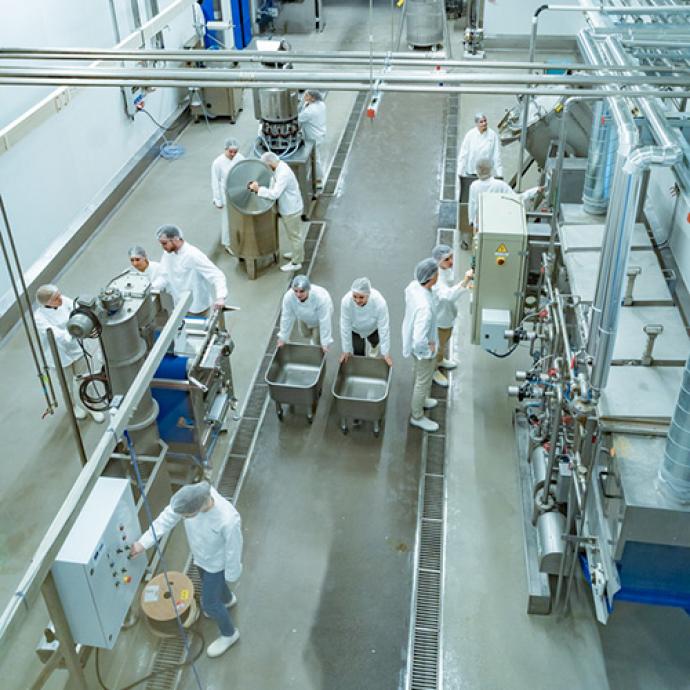The IDEALISS research unit aims to evaluate the effects of the environment and diet, starting with the choice of raw materials, on the onset of chronic diseases and aging, through an integrative approach that takes into account the health of humans, farm animals, and pets. Located on our Beauvais and Rouen campuses, it is made up of around forty teacher-researchers, post-doctoral researchers, and doctoral students.
The ambition of the IDEALISS unit, which emerged from the former Transformations & Agroressources unit, is to contribute to understanding how the processing of agricultural raw materials and human activities affect animal and human health, and to propose more sustainable food approaches tailored to the specific needs of animals and humans.
Through an integrative approach, it will also seek to understand the molecular and cellular mechanisms associated with chronic diseases and aging in order to propose preventive approaches aimed at improving the well-being and healthy aging of individuals.
It will also propose innovative approaches to livestock farming systems for better preservation of animal health and welfare.
- Contribuer à une amélioration du bien-être et de la santé des animaux de production, de compagnie et de l'humain par des approches translationnelles innovantes et de précision en lien avec le concept de santé globale.
- Proposer des outils et des méthodes permettant de bien vieillir avec un meilleur respect de l'environnement de l'individu et des populations.
The IDEALISS scientific project
The first area focuses on the effects of food matrix transformation on consumer behavior and its consequences on digestive homeostasis. It aims in particular to characterize raw and processed materials and the consequences of formulation and processing on the nutritional, organoleptic, technological, and health qualities of foods, as well as on consumer behavior and digestive homeostasis.
The second area focuses on understanding the effects of the environment and diet on the onset of chronic diseases and aging using an integrative approach ranging from the characterization of molecular and cellular mechanisms to the preventive approach to the risks associated with these diseases.
The third area aims to support professionals in improving the welfare and performance of production animals through an integrative approach in a defined territory through epidemiological field studies of pathogens. This component also aims to study the risk factors and mechanisms of action of pathogens to improve decision-making. Finally, it also involves proposing alternative/innovative approaches to livestock farming systems for better animal health.
A team of around forty teacher-researchers, post-doctoral researchers, and doctoral students
Beauvais Campus
- ADAM Adeline - Expertise in Microbiology
- ANTON-GAY Pauline - Expertise in digestive physiopathology, nutrition, and food safety
- BARBEZIER Nicolas - Expertise in Molecular and Cell Biology
- BODARD Anne-Laure - Expertise in plant biotechnology, molecular and cellular biology, identification of HMW-GS in soft wheat
- BOUGHATTAS Ferdaous - Expertise in Data Analysis, Design of Experiments, Food Science and Technology
- BREIL Béatrice - Expertise in Institutional Catering
- BUCHE François - Expertise in Food Science and Technology
- DELAYRE-ORTHEZ Carine - Expertise in Immunology and Pharmacotoxicology Immunotoxicology, allergies, immune dysfunction
- DEPEINT Flore - Expertise in applied human nutrition, clinical research, phytonutrients, energy metabolism, intestinal absorption
- DRUON Cyril - Expertise in food process engineering, process optimization, automation
- DUGA Claire - Expertise in prevention and health education through nutrition
- GALLOIS Nicolas - Chemical technician
- GAUTIER Camille - Expertise in Animal Reproduction
- HALLAL Nancy - Expertise in Human Nutrition / Animal Behavior and Physiology, Skeletal Muscle Contractility
- ILLNER Anne-Kathrin - Expertise in Human Nutrition / Public Health / Nutritional Epidemiology / Health Education
- JACOLOT Philippe - Expertise in Analytical Chemistry
- JOUQUAND Céline - Expertise in Food Science, Formulation and Sensory Analysis, Flavors, Maillard Reaction
- LAGUERRE Jean-Claude - Expertise in food engineering, thermal and microwave processes, experimental design and process optimization, data analysis using correlation iconography
- MADEC Jean-Yves - Expertise in Animal Nutrition / Animal Science, Formulation
- MARIER David - Expertise in Microbiology
- MATHIEU Hugo - Expertise in Molecular and Cell Biology
- NESTORA Sofia - Expertise in biotechnology, bioprocesses, microbiology, and food technology
- NIAMBA Narcisse - Expertise in biological and clinical statistics and biostatistics
- NIQUET-LERIDON Céline - Expertise in Analytical Chemistry
- PEROT Maxime - Expertise in Immunology
- POUILLART Philippe - Expertise in Immuno-nutrition / Culinary practices and health and medical-social catering
- RAME Véronique - Expertise in Microbiology
- REGNAULT Stéphanie - Expertise in protein biochemistry, nutrition
- RODRIGUEZ LOPEZ José-Miguel - Expertise in Animal Physiology / Animal Sciences
- SARRON Élodie - Expertise in Microbiology / Hygiene / Decontamination
- THIRY Clémence - Expertise in Nutrition / Prevention and health education through diet
- YOUNES Hassan - Nutrition expertise / Prevention and health education / Plant-based products / Dietary fiber / Metabolic diseases / Malnutrition
Rouen Campus
- BEERTS Charlotte - Expertise in Anatomy / Horses / Locomotion / Source cells / Osteoarthritis
- BOULOCHER Caroline - Expertise in Anatomy / Osteoarthritis / Pets
- CLEMENT Bianca - Expertise in Microbiology / Infectious Diseases / Microbiota / Small Ruminants / Udder
- DESANTI Hélène - Expertise in Production Animals / Internal Medicine / Animal Welfare
- GRECH-ANGELINI Sébastien
- HOUMMADY Sara - Expertise in Aging, carnivores, behavior, frailty, nutrition
- LABMAR Rym
- LEFRANCOIS Estelle
- MAHJOUB Tarek
- MANSUIT Rohan
- PAPA Paula
- ROBLES Morgane
- STEPHAN Yohan
Current projects
ALIMCARE Project
Food as a preventive health tool linked to care and the pleasure of eating.
Funding body: Caisse des dépôts
DéfiFamille Project
Raise awareness among local families about eating healthy, organic, and local food without increasing their food budget, while taking care of their health, animals, and the environment.
Funding body: Beauvaisis Urban Community
DHOLE Project
Impact of fiber on the diet of a wild canid, the dhole.
FeliCog Project
Evaluation of microbiota and cognition in older cats.
FELICROBIOTE Project
Analysis of the evolution of the fecal microbiota of the Sumatran tiger (Panthera tigris sumatrae) in captivity.
Nutricourses Project
Characterization of consumer profiles in the Hauts-de-France region according to their purchasing behavior and their relationship with Nutri-Score in order to identify levers for action to encourage healthier choices.
Funding body: Eurasanté - Clubster Nutrition-Santé-Longévité
SATIVAPET Project
Study of the effect of cannabidiol on the behavior of shelter dogs.
In support of the LEEC of Nanterre and the AVA association.
Projet MenoHeart
Évaluer les causes de maladies cardiovasculaires chez les femmes du Beauvaisis autour de la ménopause et proposer des plans de prévention et de prise en charge de ces patientes pour réduire les risques.
Financeurs : Région Hauts-de-France, Communauté d'Agglomération du Beauvaisis
Completed projects
ADAGIO Poject (2020-2023)
Objective
In recent years, following new requirements dictated not only by consumers but also by professionals in the processing and even distribution sectors, the development and sustainability of the meat industry has been weakened.
Changes in regulations and consumer demands are forcing us to rethink animal feed without incurring additional costs.
The ADAGIO project aims to create and demonstrate the impact of a nutritional solution that promotes the development of intestinal mechanisms leading to good digestive health in farm animals, particularly in the France-Wallonia-Flanders region. This research could also lead to the development of food supplements for human consumption.
Partners
Sanluc International, GenoScreen, ALGOFIT, Ghent University
Contact: Nicolas BARBEZIER
ExoAGEIng Project (2019-2023)
Effects of early-life and chronic exposure to dietary AGEs on chronic low grade inflammation and age-associated disorders in response to the ANR 2020-2023 call for projects. The objective of this collaborative project is to understand the biological mechanisms by which perinatal or lifelong exposure to C-Carboxymethyl-Lysine in the diet contributes to the induction of chronic low-grade inflammation and non-communicable diseases.
UniLaSalle contact: Carine DELAYRE
Projet Alimaidants (2023-2025)
Projet de prévention visant à préserver la santé et le bien-être des aidants et de leurs proches en agissant sur leur alimentation.
Financeur : Conférence des financeurs de l'Oise

Platforms
- Cheese and dairy production workshop
- Bakery
- Veterinary School Hospital Center (fall 2025)
- FoodLab
- Health Lab (January 2026)
- Microbrewery
- Culinary Practices Platform
- Microbiology Platform
- Molecular and Cell Biology Platform
- Analytical Chemistry Platform
- Process Engineering Platform
- Sensory Analysis Room
Networks and partners
- EEC Laboratory (Prof. C. Féron) - UR 4443 - Sorbonne Paris Nord University
- Curie Institute
- Pasteur Institute
- Amiens Metropolitan Zoo
- Peritox Laboratory (Prof. Véronique Bach) - Jules Verne University of Picardy
- INSERM UMR 1245 (Prof. Moise Coeffier) - Rouen University Hospital - University of Rouen
- INSERM UMR 1167 (Prof. Eric Boulanger) Lille University Hospital University of Lille 2 - Pasteur Institute - Junia
- INSERM UMR MEDyC (Prof. Philippe Gillery) Reims University Hospital University of Reims Champagne Ardennes
Competitiveness clusters: B4C, Clubster NSL

